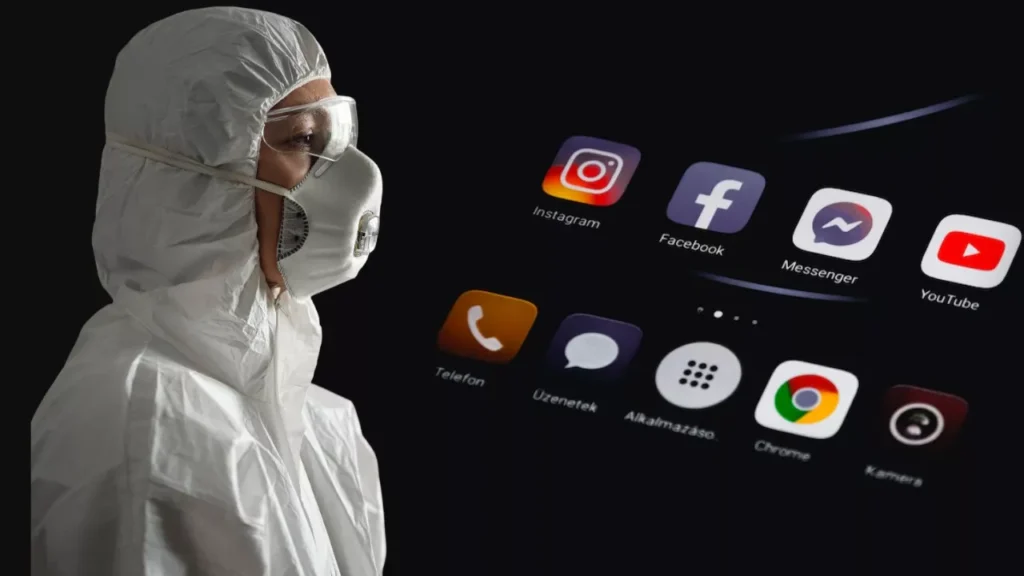Introduction
Social media platforms offer an extensive range of content and accounts that wield considerable influence over our emotions and well-being. The effects of social media can be bad or good for us depending on how we use social media.
As individuals, we can be mindful of our social media usage and possess the power to shape our social media experience by curating our feeds and intentionally selecting accounts and content that inspire, educate, and uplift us.
Negative social media effects have been reported extensively and it seems we all are vulnerable to those negative effects. So, it is wise for us to keep track of our social media usage, and its effects and find ways to make our social media usage productive rather than damaging to our psychological and emotional health.
In this post, we will discuss why and how social media can have negative effects on us and some practical steps to make our social media usage more productive. So stay tuned.
1. Be Mindful of Your Emotions
A great range of emotions, including both positive and negative ones, can be evoked by social media. It can inspire, connect, and amuse us, but it also has the power to arouse unfavorable feelings like resentment, rage, or grief. It is important to be conscious of these feelings and recognize when specific accounts or information negatively affect your mental health.
A fundamental way to safeguard yourself against the detrimental effects of social media is by paying close attention to your emotions during its usage. Take notice of how you feel after scrolling through your feed or interacting with specific accounts.
Consistently experiencing negative emotions or engaging in comparisons with others may indicate that certain content is negatively affecting your mental health.
Mindfulness of your emotions also entails being cognizant of the time and energy you invest in social media.
Numerous studies have emphasized the significance of mindfulness and proactive management of emotions while using social media to foster a healthier and more positive online experience.
These techniques protect your mental health, let you concentrate on material that makes you happy and fulfilled, and promote a better relationship with social media platforms.
After you have identified what makes you happy, sad, or frustrated on social media, proceed to the following steps.
2. Curate Your Feed on Social Media
The effective way to curate your feed is by purposefully choosing to follow accounts that promote positivity, mental health awareness, and personal growth. Seek out individuals, organizations, or communities that share uplifting messages, motivational content, and practical advice for personal development. These accounts serve as a source of regular inspiration and encouragement, nurturing a positive mindset as you navigate social media.
Moreover, consider following accounts that align with your interests and passions. Your social media experience is made more enjoyable and fulfilling by following accounts that are linked to your interests, whether they are in the areas of art, photography, fitness, travel, or any other topic. You will feel more connected and have better overall health if you surround yourself with information that shares your hobbies.
It is important to remember that curating your feed does not involve producing a perfect or idealized representation of reality. Instead, it involves consciously selecting content that exerts a positive impact on your emotions, mindset, and overall mental well-being. The goal is to fashion an online environment that uplifts and inspires you, fostering personal growth while mitigating feelings of comparison, negativity, or self-doubt.
Most social media algorithms have been designed in such a way that when you spend a certain amount of time watching a particular type of content, it tends to provide the same type of content again and again. So, when you select a positive type of content to watch, you will get more positive posts to watch or read.
By taking control of your social media experience and curating your feed, you shape a more positive and rewarding online environment for yourself. Surrounding yourself with accounts and content that inspire, educate, and uplift you holds substantial influence over your overall well-being, amplifying your mindset and facilitating personal growth.
3. Limit Your Social Media Usage
To counteract the negative effects of social media, one effective approach is to establish boundaries around our social media usage. This involves consciously determining the amount of time we allocate for these platforms each day and adhering to that limit. By doing so, we reclaim control over our time and prevent it from being engulfed by mindless scrolling or constant updates that can amplify our emotions.
Establishing a social media usage schedule is a useful method to put this idea into practice. We add structure and discipline to our daily routine by establishing set times during the day, such as the morning or evening, when we can engage on social media. This strategy prevents social media from taking over our entire day and enables us to manage our time more carefully.
Additionally, regular social media breaks are essential. We can detach, refuel, and concentrate on other significant elements of our lives during these gaps. Incorporating short breaks throughout the day or dedicating entire days without social media can help establish a healthier balance, allowing us to prioritize our well-being.
According to research, establishing boundaries and restricting social media use can greatly enhance our general well-being. By taking back control of our time, we lessen the negative effects of overuse, allowing us to use social media with intention and benefit. With this deliberate approach, we can interact with others, look for insightful information, and appreciate the advantages of these platforms without becoming overawed by any potential negative aspects.
4. Practice Digital Detox
The most effective way to implement a digital detox is establishing designated “no-phone” zones or times throughout the day. This means setting specific areas or moments where we consciously refrain from using our phones or accessing social media. For instance, during meals, we can create a “phone-free” zone to foster meaningful conversations and fully appreciate the dining experience. Before bedtime, we can establish a screen-free period to promote better sleep and relaxation.
Taking breaks from social media also entails carving out dedicated periods of time to disconnect from our digital devices entirely. It is important to set regular periods when we refrain from using social media, such as a few hours or even whole days. We can do things that make us happy, encourage awareness, and help us connect more deeply with the present moment during these times. This may be engaging in hobbies, being outdoors in nature, reading, engaging in mindfulness or meditation exercises, engaging in physical activity, or spending quality time with loved ones.
Disconnecting from social media on purpose frees up time for introspection, renewal, and the development of stronger relationships with both ourselves and others. This practice enables us to be more present and involved in the activities and relationships that are important to us by reducing the constant stimulation and information overload that frequently accompany social media.
We can reclaim control over our time and attention, put self-care first, and create a healthy relationship with social media by partaking in a digital detox. It gives us the power to create a more harmonious balance between our offline and online lives, enhancing our general well-being and mental health.
It is crucial to keep in mind that a digital detox doesn’t have to be a zero-sum game. We can start by incorporating small breaks and gradually increase their duration as we become more comfortable. Finding a rhythm and approach that aligns with our lifestyle and needs is key.
By regularly practicing digital detoxes, we can foster a healthier and more mindful approach to social media usage. This empowers us to maintain a positive relationship with technology while prioritizing our well-being and fostering a stronger connection with the present moment.
5. Set Realistic Expectations
Because of the prominence of well-curated and idealized representations of people’s lives, social media platforms unintentionally contribute to the formation of irrational expectations and feelings of inadequacy.
One of the challenges associated with social media is the inclination to present a highlight reel of life rather than a complete and authentic picture. Users often choose to showcase their best moments, accomplishments, and experiences while omitting the less glamorous aspects of their lives. This selective sharing creates an illusion of a perfect and idealized existence. Constant exposure to such curated content can give the impression that everyone else’s lives are flawless, fostering unrealistic expectations for oneself.
It is important to understand that what we see on social media platforms is frequently a heavily edited and filtered version of reality users who consume social media material. There are periods of strife, flaws, and obstacles hidden below the social media posts, and outward appearance of perfection. It is crucial to keep in mind that comparing oneself to these artfully prepared images can result in insecurities and a skewed view of one’s own life.
You can take the superhero movies as an example. The superheroes we see in the movies are ordinary people like us and can not exhibit those abilities in real life. Likewise, people tend to show their superhero side on social media which they are not in real life and no one can be. So, stop beating yourself.
Here are some ways to deal with unrealistic life pictures on social media:
- Remember it is a highlight reel: Understand that social media is a highlight reel where people tend to showcase their best moments and achievements. It does not encompass everything that has happened to them or all of their difficulties. Keep in mind that you are only witnessing a portion of their reality.
- Exercise perspective-taking by attempting to imagine yourself in the position of the person uploading the images. Recognize that even if it doesn’t seem in their posts, they can be going through hardships and difficulties in their lives. Understand that everyone experiences highs and lows and that social media may not always provide the complete picture.
- Instead of focusing on how you compare to others, concentrate on your own development and path. Keep in mind that your value and success are not based on how many likes, follows, or Instagram-worthy situations you have. Set your own standards for success and pursue your own objectives.
- Limit your exposure to upsetting stuff: You might want to unfollow or mute particular profiles or content if it constantly makes you feel inadequate or brings on unpleasant emotions. Focus on accounts that support authenticity, self-acceptance, and good values to surround oneself with inspiring and uplifting content.
- Self-compassion is a virtue. Treat oneself with kindness and gentleness. Understand that no one’s life is flawless, not even your own. Be kind to yourself, acknowledge your accomplishments, and focus on your talents. You should be kind and understanding to yourself just as you would be to a friend.
- Consult someone you trust, such as a friend, family member, or mental health professional, if social media starts to cause you a lot of distress or has a detrimental influence on your self-esteem. They can offer direction and support as you go through these emotions and assist you in creating plans to keep a positive outlook.
6. Engage in Meaningful Interactions
A fantastic chance to connect with friends, family, and communities throughout the world is provided by social media platforms. However, you risk missing out on significant relationships if you are just passively reading through your social media page. You may improve your social media experience and make it more rewarding and beneficial by taking an active role in conversations and building connections.
Finding and connecting with others who share your interests or ideals can be a powerful approach to participating in meaningful relationships. Follow and engage with accounts that align with your passions, hobbies, or causes you deeply care about. Engage in dialogue and discussion within these groups to increase your learning, get knowledge from others, and share your personal experiences and thoughts.
It is important to keep a constructive and upbeat attitude when conversing. Approach interactions with respect, empathy, and an open mind. Participate in intellectual conversations while actively listening to others and validating their points of view. You help others and yourself have a more positive social media experience by creating a welcoming and inclusive online community.
It is crucial to keep in mind that meaningful connections on social media can occur offline as well. Utilize social media as a tool to develop and solidify in-person relationships. Meet up with people you connect with on social media, go to events, or work together on projects. By translating online connections into offline interactions, you can build deeper, more meaningful relationships.
Lastly, it is crucial to prioritize your well-being while engaging in social media interactions. Make self-care a priority and establish boundaries. It is acceptable to stand back and reevaluate if certain conversations make you feel worn out or overburdened. Put your energy into creating relationships that make you happy, inspired, and a part of something.
You can switch from passive consumption to active engagement in social media by actively participating in meaningful interactions. Making connections, exchanging knowledge, and cultivating relationships of support not only makes your social media experience richer but also helps to create an online community that is more upbeat and cheerful.
7. Seek Knowledge and Learning Opportunities
Social media platforms offer a wealth of information and unique opportunities for learning and personal growth. Instead of merely using social media for entertainment or socializing, you can harness its potential as a valuable tool for acquiring knowledge and accessing educational resources.
To seek knowledge and learning opportunities on social media, one effective approach is to follow thought leaders, experts, and organizations in your areas of interest. Identify individuals or institutions that share valuable insights and content related to your fields of curiosity or professional development. You can get a carefully selected stream of information, professional insight, and thought-provoking content by following these accounts.
Consider participating in webinars, live sessions, and educational groups held on social media platforms in addition to following accounts. Many thought leaders and organizations utilize social media to offer virtual events, workshops, and educational sessions. These platforms offer a dynamic setting where you may connect with subject matter experts, pose inquiries, and gain knowledge from their experiences and knowledge.
Additionally, social media platforms frequently support online communities that are focused on particular subjects or sectors. By joining these communities, you can meet people who have similar values and interests to you. Within these groups, conversing, exchanging thoughts, and posing queries can produce insightful discoveries and cooperative learning opportunities.
Be attentive and skeptical while using social media for educational reasons. Verify the credibility of the sources you come across and fact-check information before accepting it as accurate. Remember that not all content shared on social media is reliable or unbiased. To increase your comprehension, seek out reliable sources, take into account many viewpoints, and participate in thoughtful debates.
You can actively seek out knowledge and learning opportunities online using social media as a platform, which will help you enhance both your career and personal development. Accept the range of content that is provided and utilize it as a starting point to learn more about new subjects, expand your knowledge, and stay up to date with developments in your areas of interest.
However, it is important to strike a balance between reading for educational purposes and attending to your overall welfare. Establish limits, give yourself a high priority, and watch how you interact on social media. Remember to take breaks, disconnect when needed, and engage in research as well.
You can take advantage of the power of social media platforms to broaden your horizons, pick up new skills, and interact with a world community of learners by looking for information and learning opportunities there. Take advantage of social media’s educational capabilities while yet using caution and moderation in your online endeavors.
8. Seek Support When Needed
Our mental and emotional health could be substantially impacted by social media. It is essential to seek advice and help if you frequently feel overwhelmed, anxious, or have other unfavorable emotions as a result of your use of social media.
One of the first steps you can take is to confide in a family member or friend you can trust. Talk openly and honestly with someone about your worries and feelings. They can offer a sympathetic ear, a different point of view, and emotional support. Talking about your concerns and experiences with someone else might occasionally lighten the load and provide fresh perspectives.
You might find it helpful to consider consulting with a mental health professional in addition to seeking assistance from people nearby. These professionals have the expertise to guide you through the complexities of your emotions and provide counsel tailored to your specific needs. They can provide you with advice on how to manage the negative impacts of social media on your mental health, help you create coping strategies, and look into any underlying issues. Finding a more healthy balance with social media can be facilitated by speaking with a mental health expert like a therapist, counselor, or psychologist.
It is critical to keep in mind that asking for help is not a sign of weakness but rather a proactive move toward giving your mental health priority. It is vital to prioritize your mental health and seek help when necessary, just as you would if you needed it for any other part of your total well-being.
Self-care is crucial, in addition to asking for support from others. Take part in leisurely pursuits that encourage reflection, renewal, and relaxation. Practicing mindfulness or meditation, engaging in delightful hobbies, taking time to enjoy nature, or developing self-compassion are some examples of how to do this. You can better handle the difficulties and emotions that result from using social media by taking care of your general well-being.
You offer yourself the chance to process your feelings, gain understanding, and create healthy social media engagement techniques by asking for help when you need it. Reaching out for support—whether it comes from family members or a professional—is a proactive move in preserving your mental health and developing a positive connection with social media.
Remember that you don’t have to handle these difficulties by yourself. Reach out, voice your worries, and ask for assistance from others as you work to achieve a better balance with social media.
9. Spend More Time with Offline Relationships
Real relationships, including in-person conversations and spending time with friends and loved ones, have a lot of benefits for mental health compared to interactions on social media. The following are some advantages of face-to-face interaction over social media interaction for mental health:
- Increased sense of closeness: Genuine connections give people a stronger sense of intimacy. Nonverbal cues, such as body language and facial expressions, can be used to establish rapport and understanding when people are physically present with each other. Increased sentiments of support and belonging might result from this connection, which has a favorable effect on mental health.
- Enhanced social support: Real interactions offer an opportunity for emotional support, empathy, and understanding. Feelings of loneliness and isolation can be reduced by having deep talks and exchanging experiences with people. It establishes a network of support that fosters positive mental health outcomes, such as less stress and enhanced coping skills.
- Improved mood and well-being: Real interactions often lead to more authentic and genuine experiences. Engaging in activities and hobbies with others, such as going for a walk, participating in group exercises, or sharing a meal, can boost mood and overall well-being. These experiences contribute to a sense of enjoyment, fulfillment, and positive emotions.
- Reduced feelings of comparison: Social media interactions can often lead to the “comparison trap” where individuals compare themselves to others based on their online presentations. Real interactions, on the other hand, provide a more realistic view of others’ lives, reducing the likelihood of negative self-comparisons. This can alleviate feelings of inadequacy and improve self-esteem.
- Enhanced communication skills: Real interactions involve active listening, nonverbal cues, and nuanced communication, which can improve interpersonal skills and emotional intelligence. These skills are essential for building and maintaining healthy relationships, which are vital for mental health and overall well-being.
- Lower risk of social media-related stressors: Social media interactions can expose individuals to cyberbullying, negative comments, or excessive social comparisons. Real interactions provide a safer and more controlled environment, reducing the likelihood of these stressors and their negative impact on mental health.
While social media can provide a convenient way to connect with others and share experiences, it is important to balance it with real interactions. Strive to prioritize face-to-face interactions and meaningful connections to reap the mental health benefits they offer.

About the Author:
Shahid Essa is a blogger and M. Phil Scholar at Iqra University Karachi


